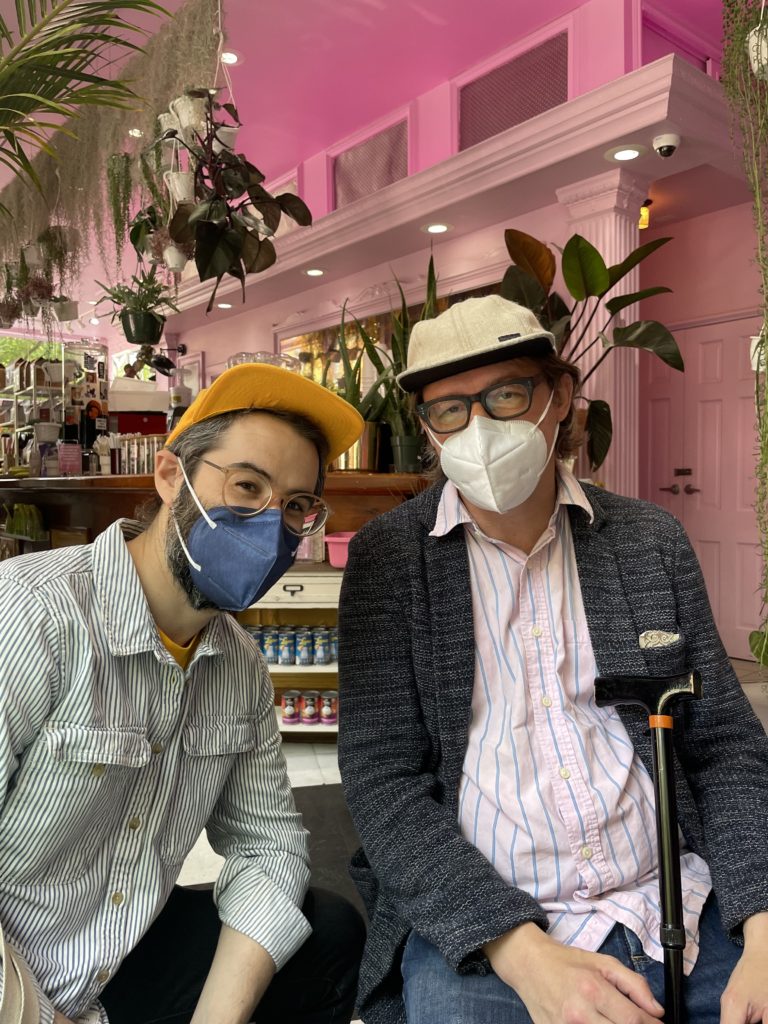On Friday, June 3rd, 2022, starting around 2pm, Andrew Livingston and Dave Ruder (of Gold Bolus) spoke at the corner of Lafayette Ave & Grand Ave about Andrew’s recent album Thornwood, quiche, mortality, and a whole lot more. This text has been lightly edited for clarity.
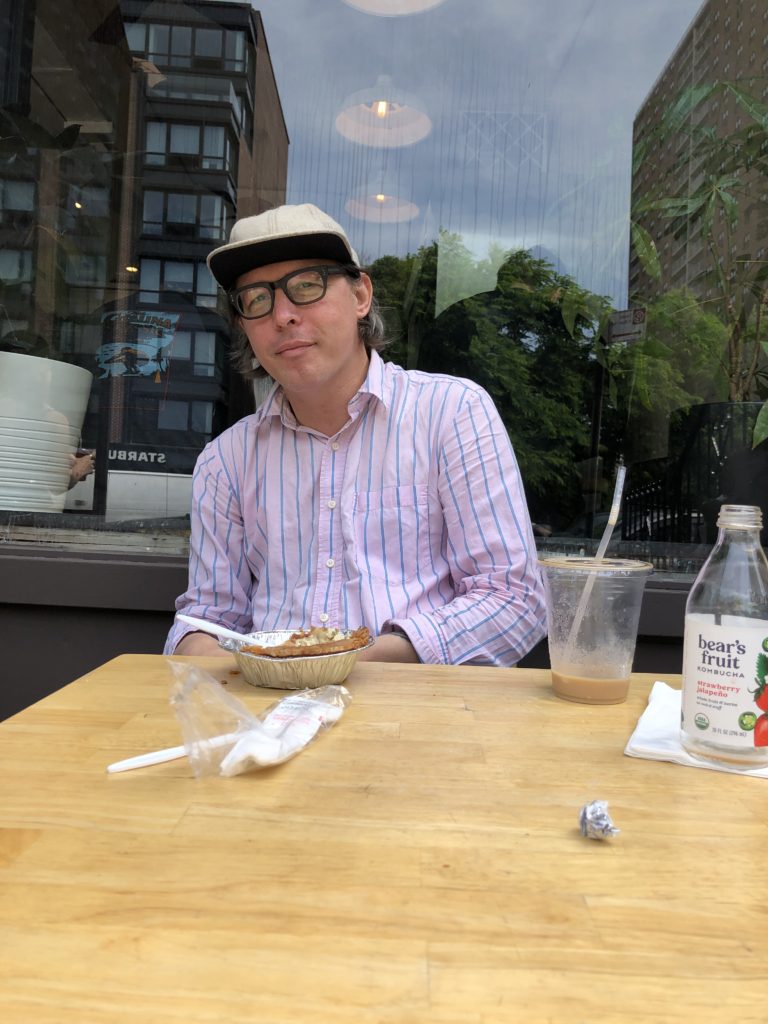
DAVE: I can also wait until, I don’t know if you wanna be eating during the thing or if you want me to wait until the quiche is in your tongue.
ANDREW: Oh, we can go ahead.
DAVE: All right. So the quiche is part of the interview.
ANDREW: I mean, hopefully there won’t be too many mouth sounds. Oh my God. Mouth sounds
DAVE: Small. Mouth sounds. Mouth sounds.
ANDREW: <laugh>
DAVE: Um, yeah, I wanna start at the first track. Tell me about “Thackery”.
ANDREW: “Thackery”. Some crazy shit.
DAVE: Short for Zachary.
ANDREW: Well, that would be great. Something to be short for something that’s actually one letter longer I’ve often thought, wow, this is a big digression, but nicknames that aren’t nicknames, that aren’t short, should be called Nicholas names.
DAVE: <laugh>
ANDREW: And I feel like that happens a lot. “Thackery” deals with, that’s kind of maybe like the heaviest thing on there. Content wise, it deals with in kind of veiled, maybe not really veiled, but just not very explicit, really traumatic things and forgiveness. And, it’s weird cause I actually think of it as a kind of, I don’t think of it as a terribly sad song, but more than other things on there, it’s like, it’s like a piece, you know.
DAVE: More than a song.
ANDREW: Yeah. To me it is. I mean, maybe there’s like an actual song part. That’s like when the singing is, you know, and it’s really just a short kernel with like, words in front of it. There’s words in the middle, and music in front of it, and behind it that’s actually, I don’t know. Sometimes I do a thing which maybe this is an example of. I have such a hard time with lyrics. Like when I listen to music, I love lyrics when people do it. Well, like my friend, Mike [Doughty], that I always play with, one of the reasons I love him so much is because he’s such a great lyricist. But for me, the it’s so hard. I do, I get cheesed out by words so much that I have to have it as minimal as possible, as few words to get the point across and then the rest just be music.
DAVE: What is the difference then between a piece and a song for you?
ANDREW: Maybe it has to do with how it’s written, because like the “Thackery” thing was kind of composed in a way. But songs are like, I hope this isn’t dismissive, but like bowel movements, you know? It’s like, when you’re ready, you just sit down and do it. I think both are really valid songs are almost like gifts. It’s just like, yeah, play these chords, do this thing. Maybe say these words, that’s great. <laugh>
DAVE: I’ve had this notion for many years, which is my own little concept of it. That a piece is a piece because you can make the rules be whatever you want. Like you can set gravity to be 9.8 meters per second squared. Or you could say, actually gravity is 16.7 meters per second squared in my piece. But in my mind, all songs are the same rules. And also all songs are connected to every other song.
ANDREW: Wow.
DAVE: And you can, you know, smash any songs that you want together.
ANDREW: That’s great
DAVE: But a piece, I mean, you could do that with a piece, but like some pieces just have different universe scales.
ANDREW: Yeah. Yeah. Well maybe it’s like, “The Ghost of Thackery” is like song-adjacent. It’s more a piece than a song, but there’s a song and it’s like, it’s Westchester. If New York [City] seceded from the state, Westchester and Long Island would go with it. Right? It’s adjacent, thus goes “Thackery” with songs. I thought like… I feel weird because it, if people really knew like the depth, it is actually a really vulnerable thing. It’s heavy. And it ends with a like kind of metal thing. Yeah. Which I think is great. You know, I actually wish there was more heavy metal on the record than there is, but at least there’s that. So.
DAVE: I’m curious for, for “Blackbird”, if you feel like “Blackbird” is a song or a piece or neither or both?
ANDREW: You know, I don’t really know. It’s not a song. I think it’s just an occurrence, but I’m very fond of that one. That’s I’m glad you brought that up, but I, I don’t, maybe it changes, maybe everybody that makes records, if we should still even make records, it changes all the time. But those are probably my two favorite pieces on there. It’s “Blackbird” and “Thackery”.
DAVE: So what is your history of association with the acclaimed SR-71 Blackbird?
ANDREW: I mean, when I was a kid, I thought they were really cool cuz they are, I mean, <laugh> like, I’m not like really into war or instruments of war, but those things are really cool. And I think I had a picture of one in my room when I was little, along with my Max Headroom posters and my Alf poster and my <laugh> my, uh, weird Def Leppard poster. But anyway, but Blackbirds are dope man. And I had been kind of chanting the “SR-71 Blackbird” thing. Almost every time I was driving while I was by myself. I don’t know why it was just like so fun to say. And then, I don’t know. I was house sitting for somebody that had a model with one and that’s when I recorded that with his stuff.
DAVE: So actually that’s something I wanted to ask you about your other stuff, particularly the Piad [Guyvessant] albums, I think of being really grounded in your Williamsburg apartment.
ANDREW: Yeah.
DAVE: And that apartment isn’t around anymore because of the fire. And you lived in a couple places and you recorded this in a couple different places. So what was the experience of making an Andrew Livingston album, like in a different place than your Williamsburg department?
ANDREW: It was actually dope. A lot of it was made in my place in Yonkers, which I feel like, I have a desk facing against a window and I have all my instruments kind of around the desk. And <laugh> I feel like I just stared out the window and like music grew like mold.
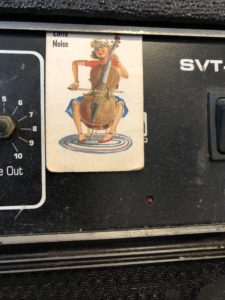
[loud truck interrupts]
And well, some of it was done there. A lot of it was done there. I was subletting at a producer’s house right after my fire happened. And she had like nice microphones and stuff, but most of it was done really low-fi… [sees a truck] Entenmann’s cookies. That’s great. That’s so collegiate… And some of the vocals were done in my car, which I think’s great.
DAVE: Do you wanna name names of any tracks where the vocals were done in your car? Or do you want that to be a secret?
ANDREW: Well, “Juniper Elbow” was done in my car at Juniper Park, in Queens.
DAVE: Spicy
ANDREW: On Juniper Valley Road. <laugh> There’s actually a business called Juniper Industries in Queens. And, but the building says Juniper Elbow and I’ve been so into that. They make like parts for submarines, which is and weird stuff like that. But I’m fascinated by that company. If I had to get like a jobby job. Yeah. Maybe I could go there and be like, I mean, I’d feel like three kids with a trench boat, trying to look up, but I’d be like, I am here for a shot. I don’t know why I’m just so into this it’s across the street from the Arby’s on Metropolitan Ave, and down a little bit.
DAVE: So when you recorded in your car, were you just recording on to your phone?
ANDREW: No, I brought, I would make sure my computer had enough juice for me to do at least like three or four takes
DAVE: With the interface and everything?
ANDREW: Mm-hmm
DAVE: You just wanted a particular sonic environment.
ANDREW: Yeah, no, I also did this thing where, I mean, I did that with a bunch of tunes. I recorded the vocals in my car, but the rest of ’em didn’t make it on the record, but I would do it in weird places in New York. And often I would have like my [SM-]58 microphone or whatever, and I’d be watching people walk by and, and part of what my thought was that like, they have no idea that like, it’s, it’s really unlikely, but like what if somebody heard this? And then actually walked by me when I was like… I did one on Franklin, in Greenpoint on Franklin Street, at a really heavy populated area. And I was just sitting in my car singing and that’s dope.
DAVE: How do you relate to the current genre that exists in the culture of the, the man, usually a man, usually about your age, sitting in his car, recording a video for social media, you know, like just talking about something on YouTube or on TikTok or Instagram or whatever? Do you feel like by recording an album with an SM-58 and an interface and a computer in your car that you are interfacing with that genre of contemporary communication?
ANDREW: Probably because whether I like it or not, I’m one of those men that’s old enough to where if I take a selfie… I can’t take selfies. Like, if I had to make an online dating profile, it would look ridiculous. You know, I’d look, <laugh> I’d look really mad, but I’m just trying to look like a dude, you know? So I’m sure if I was like, “let me tell you how I catch fish” or whatever, you know… It’s I guess it’s kind of weird to be self-aware but know that there’s nothing, that I’m powerless over it. I’m like a, I’m a 46 year old weirdo, man. I’m an aged hipster. Like when we first started using the word “hipster”? I was like in the freshman class, I think of like, maybe… But yeah. I think I thought I’d grow up and be cooler than “guy doing TikToks in his car”, but I’m not.
DAVE: Here we are at a cafe at a cool Brooklyn spot <laugh> and we’re wearing hats on our heads. And we have buttons on our shirts. That’s not right.
ANDREW: Yeah. I’m eating a quiche. I’ve kind of destroyed this quiche.
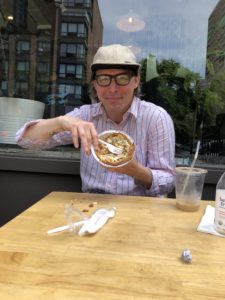
DAVE: God made a beautiful quiche and you destroyed it. So I know that a big part of the language that we’ve had around this album has been about pain. And you talked about that a little bit with “Thackery”, but I feel like that’s also been true of some of the past stuff that you’ve put out. It just seems more intentional in the narrative this time.
ANDREW: Yeah.
DAVE: Is that true? That that’s like a big part of the narrative of some of the previous albums you’ve done, or do you feel like this one is different? Not only in how you’re kind of framing it, but in what the content is?
ANDREW: I don’t know. I mean, I think it’s less veiled than other stuff I’ve done because I kind of don’t have as many metaphors to offer anymore. You know, it’s like, I needed everything on here to like, be somehow meaningful to me. And, I do do a thing on this record where the… inside jokes is not the right thing, but a lot of things that are layers in here of like stuff about growing up and stuff that is not… there is metaphor there, and there is like kind of a secret language to it, but it’s also like, I don’t know. There’s not a lot of bullshit either. It’s just like, this is what’s up, you know?
I mean, we live in a world, us and a lot of our friends, live in a world where all of us create things that are really strange and great. And, and sometimes it has a point, sometimes it doesn’t, but like, I feel like songs and like that kind of thing, it’s evolved some now, but there was a period to me, where it seemed like decades, where people wrote about sex or love all the time. And I, there’s so much great music about that, but I actually, to me, it’s all about mortality. I write about my wrestling with mortality and that has a lot of emotional stuff to it.
I think a lot about regret and about how like, time moves so fast that like, dang yesterday I was 27 and now I’m staring down the well of 50 pretty soon, you know? And like it happens fast and I don’t feel like I did what I needed to do. At the same time, so much crazy beautiful stuff happened, you know, that’s the kind of trip I’m on. And there’s also a thing too, where it’s like, I love art where it’s like, you don’t know how serious a joke it is. But in the interest of being a good steward of my time, I don’t want to, I don’t need to hide behind humor right now. I’ll do that more later. And cuz there’s plenty of time to hide behind humor and that’s art that’s worth making and worth doing weird fun, cool.
DAVE: And you can have elements of humor on this. Like “Blackbird” in its way is a funny track, but it’s not…
ANDREW: It’s not a joke.
DAVE: Yeah. It’s not masking it. I relate to that sentiment a lot. It’s like, this is absurd, but it’s not a joke.
ANDREW: Yeah. And, and it is funny in a way, but it’s, it is actually a genuine piece of art to me. [spits some quiche] Sorry!
DAVE: No
ANDREW: Projectile quiche my bad <laugh>
DAVE: Um, I, I relate a lot to the idea of lyrics about mortality and I feel like, I mean, you’re on a good three album run of that too. That I think the second Piad album, Marthopolis is very, very dealing with mortality.
ANDREW: Yeah. Right after my mom died.
DAVE: And [News from the] Oort Cloud was different. I mean, you know, it’s like lost and found, and I think this album too, it’s like, there’s some lost and found dichotomy, and some infinitely vast and infinitely tiny things.
ANDREW: Yeah. I love all that micro/macro.
DAVE: Yeah. But you know, the image that comes to my mind when I think about Oort Cloud is sort of like the, um, 2001 Space Oddity [sic] or the what’s the… Ad Astra where it’s like Tommy Lee Jones and Brad Pitt
ANDREW: I love that movie.
DAVE: So it’s like, you know, they’re in space and you’re just tethered to one guy and then like, maybe the tether comes off and you don’t really need resolution. Seeing the guy drift away. It’s just kind of that moment of like, the thing is cut and you’re not tethered to anything anymore.
ANDREW: That’s what a lot of Oort Cloud… I mean, there’s that song on Oort Cloud? Uh, I can’t remember the names of my own songs… “Outpost”. Yeah, my thought for that was like, if somehow you’d managed to stay alive in a space suit, traveling where you would kind of remember earth, but kind of didn’t give a shit anymore. You had already like, let go of expectation of anything and gone to whatever lies beyond boredom, but you’re still intrigued cuz you’re floating through space. And what if you ran into somebody, you know, it’d be like, wait, what? You’re here too! And, I feel like that kind of stuff is oddly realistic.
DAVE: [tries quoting the song:] “Your heart still remembers the words to the song” [it’s actually “Your soul still remembers the steps of this dance.”]
ANDREW: My guy. Yeah.
DAVE: So are there other dichotomies on Thornwood beyond the macro/micro, the lost/found that you would like to highlight for the listener to increase their enjoyment?
ANDREW: Well, oddly, this is a weird thing to say, but thinking about all the things that we’ve been talking about, mortality and loss, and love and blah, blah, blah. And I also think a lot about just like life and there’s a lot about plants to me on this record. I mean Thornwood, but, uh, there’s the “Juniper Elbow” thing, which I do think about… that goes into another song. I think of them as a suite, but there’s a song called “The Last Hyacinth Ever”, which to me has a huge emotional content. But it’s from the standpoint of the last hyacinth ever. And it’s not like it says anything greater, like here’s the answer, but yeah. I think a lot about like, there’s an earthiness to this and if the Oort Cloud, my last thing, is like really about space and being distant, this is about being present on here. With that life, you know?
DAVE: I think that’s an interesting transposition of a similar metaphor though. If you are the guy in the space suit who assumes that you’re the last person in that part of the universe, or if you’re the hyacinth growing in the ground on the earth and you’re the last, I like that it’s… all of the colors are different. But there’s some kind of similar flavor.
ANDREW: Mm-hmm, yeah. Well somehow, that kind of stuff resonates with me.
DAVE: When you’re talking about life too, I’m thinking about “Bernard”, which is about a spider, right?
ANDREW: It is. Yeah. Yeah.
DAVE: So what’s the life metaphor of “Bernard”, if there is one?
ANDREW: I’ve had a couple of times in my life when… [In] my old place in Brooklyn that burned down, I had a spider that I coexisted with in the bathroom named Elizabeth. And I actually don’t know if it was a female spider, but to me it seemed, I don’t know, I just called it Elizabeth. And I know that it was aware of me and I, it and we coexisted for a couple of years. And Bernard was the first spider that I did that with in my place in Yonkers. And he lived at the top of the stairs and he was a good guy. He seemed like a good guy. But also like, I don’t know, this is forgive me, cuz this is way out there. And it doesn’t matter. But like brains try to tune to each other, like a brain will try to tune to things. Maybe I’m way off here. But like if you’ve ever had to do biofeedback or done biofeedback, it’s almost like tuning your brain frequencies. And I feel like when brains are together, I think they tune to each other.
DAVE: So you and Bernard tuned to each other.
ANDREW: I wonder maybe, but I enjoyed having that spider there when I was reading, you know? Yeah. It’s like, let’s kick it, man!
DAVE: You’re not alone. It’s not a pet either. You’re not, you’re not taking care of Bernard.
ANDREW: Yeah. I actually, that’s another thing I love is inter-species relationships where I’m not like it’s master or it’s owner. I really, really like that when like bird, a specific bird, knows you or a squirrel knows you.
DAVE: Perchance, a skunk?
ANDREW: A skunk, ah, perchance to dream. And I don’t know what Bernard thought about me, but he wasn’t scared.
DAVE: I ain’t scared of you!
ANDREW: He probably could have kicked my ass if he wanted.
DAVE: What if you had to make a parallel between this album, and I’m gonna give you two categories. We can pick other ones if you want, but: What is a metal album or metal band you would compare this album to? And what is a symphonic work or orchestral work that you would compare or composer that you would compare this to?
ANDREW: Well, like there’s certain things that are whacking in this music, like “The Ghost of Thackery” starts out with this like kind of stringy thing. And it’s like, I don’t know if it does this, but <laugh>, it might be a thing where it’s like, when you first hear it, this is about to be an overture and then nothing happens. There is no overture. It’s just, <laugh> it’s just like this kind of weird, it just dissipates and turns into gas. And I think I am not presumptuous enough to compare myself to any of the greats, but I feel like Tchaikovsky does this thing. I love that stuff where it’s kind of just like, he doesn’t have to do all the developmental things that composers are supposed to do. He just has a melody that drives a bus through a whole thing. And it’s like kind of like to me, balls to bones. But I have a mentor of mine who was a guy that played in the Mississippi symphony and he used to always, he felt like Tchaikovsky, kind of didn’t really do the theory thing that, I mean, I don’t know if I agree with that, cuz it’s like really amazing orchestration, and melody for miles. So I don’t know. And I think about that stuff cuz I, I just picked musical things that were important to me and kind of let everyone, let everything else die. Metal. God, I don’t know, man. I don’t know. I have a weird thing cause I’m sometimes scared to say specific proper nouns.
DAVE: You don’t want to color the listeners ear too much?
ANDREW: But I’ll tell you some bands that, that probably no one would hear in here cuz it’s not a metal record, but I love the new Lamb of God record, the most recent Lamb of God record. I actually think they make beautiful music. I mean, brutal. Also there’s like some death metal royalty, like Immolation as a New York metal band from Yonkers. They have an album out called Acts of God and I’ve been chewing that up. And I’ve wanted to be like, “I love what you do. What would happen if, would you love what I do?” but I don’t think that’s it.
DAVE: Yeah.
ANDREW: Anyways. As far as comparing it though, I don’t know.
DAVE: Or, I mean, those are just two genres out of many…
ANDREW: Also in all honesty, another thing about this record is, [it’s] a failed attempt at a song cycle. That’s what it started as, I wanted it to be a song cycle and then it was like, you know, it’s not really what this is. This is just a record.
DAVE: So if you were to perform it, do you think that there would be some sort of element of performance, as a song cycle?
ANDREW: That would be fun. Yeah, but I don’t know.
DAVE: Are you about to perform some of this? Did you just do that? I forget.
ANDREW: I’m gonna do a song or two at an art gallery tomorrow [June 4th, 2022]
DAVE: Tomorrow. Yeah. How are you gonna interpret some of this live? Is it minimal? Is there a backing track?
ANDREW: No. I want to do some of that… I’ve never done that before… I have a lot of friends that successfully do that. I’ve never done it, but I’ve wanted, I’ve wondered. Like what could I do? If I were to do it alone, I don’t know what that would look like. I don’t know if I’d want to do that. I mean, tomorrow I am, but it’s just a song or two. And if it’s, since it’s just me, I can do stupid, weird guitar improv and then lead into the song and then right back out of it and blah blah blah. But I love the idea of like finding a way to do it as a trio. Cause I just like trios. You and I have a lot of friends that I, I feel like do that really well. How to have a balance of like technology and live music.
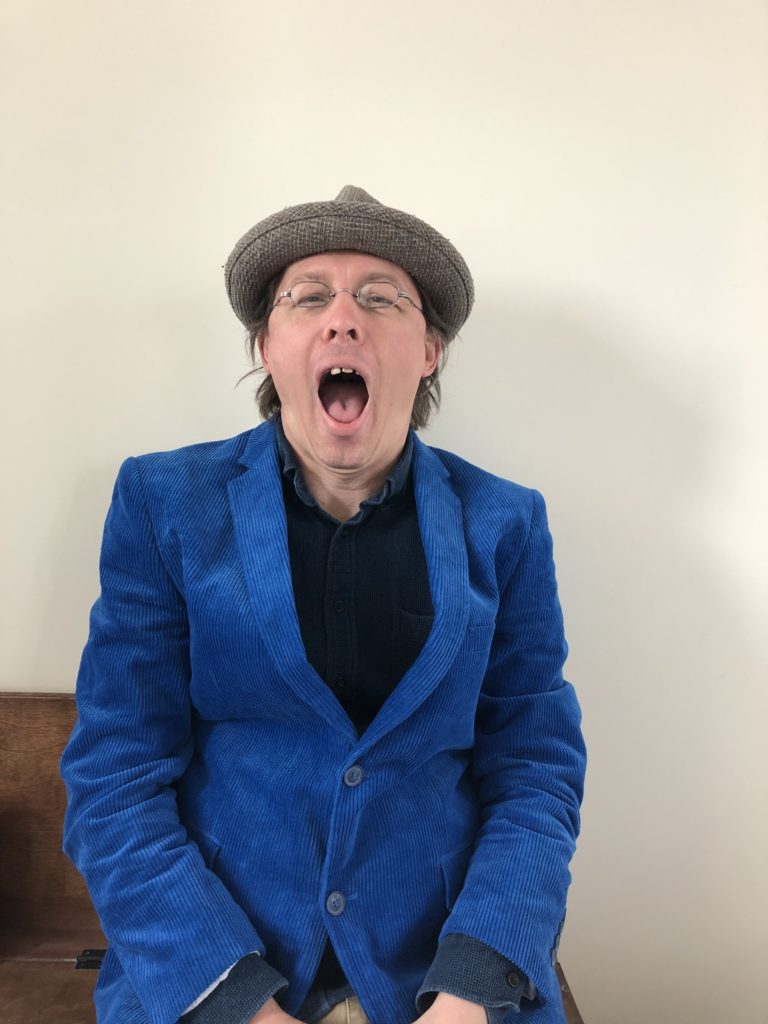
DAVE: Yeah. I feel many people are brilliant at it and I am not one either.
ANDREW: I’m not either, if I eventually I’m gonna… if it comes time to do like do shows for this, I’m just gonna have to consult a lot of people and find out what to do.
DAVE: Yeah.
ANDREW: I think it’d be fun to perform.
DAVE: That’s the questions that I had in my head. Are there other things that you would throw in for funsies?
ANDREW: It’s a coloring book.
DAVE: Talk about the coloring book! What makes a good coloring book?
ANDREW: Well, I broke my own rules because there’s a couple of things I filled in and I’m supposed to let them do that, but I couldn’t help it. Like a little kid’s hair. <laugh> I colored in his hair, even though it’s black and white. It’s like, dude, really?
DAVE: It just looked so fun.
ANDREW: I couldn’t help it. I choked. I wanted this to have an accompanying movie actually too. I have all these ambitious ideas and most of them don’t pan out, but that’s okay. You know, but yeah, I love the coloring book cuz it’s… I do have a thing where like, I think visually when I make music, So maybe that’s a little window into that in my… I’m not a good artist, but I enjoy doing it. So I hope I get to see, I hope people show me when they’ve colored them in. I really want to see some like Thornwood coloring books, colored in. [if you want to share your coloring in of the book, you can email us!]
DAVE: Heck yeah.
ANDREW: Um, what else. Be nice to your parents?
DAVE: Shout out to your dad.
ANDREW: Yeah, what’s up pop. <laugh> How you living? I played at a Yale 50th reunion the other day. That was weird.
DAVE: What year was your dad?
ANDREW: My dad probably is, maybe he would be close to his 60th year, and he never does the reunions, but I took a bunch of pictures of the campus for him and he doesn’t care.
DAVE: Well, let me close that with one more question. And then I wanna read something that I’m seeing here to you. Why, in the coloring book, is the Blackbird in the thought bubble of Dick Cheney?
ANDREW: Well, I guess cuz like
DAVE: <laugh>
ANDREW: Well, when I picture, uh, let’s just go on this little journey for a couple seconds. So I imagine like a dream scenario, like in dream reality where things are kind of real, they’re kind of not, you like take things, but imagine some dudes, some like Pentagon guys trying to like really have a heart to heart and… but they’re also like watching a film of like some surveillance, and I kept thinking about Halliburton for some reason and wherever Halliburton headquarters are and in the vastness of the universe, somebody has cried about something in there and I <laugh> don’t know what it is. Somebody’s out there, heart broken. <laugh> their Halliburton heart has been broken. <laugh> Dick Chaney’s Halliburton heart has literally been broken and is now this like awesome rotary thing, right?
DAVE: He’s a robot. I don’t know?
ANDREW: Yeah. He has like a rotary heart. He doesn’t have a heartbeat anymore. It’s just like a rotor.
DAVE: So he’s a perpetual motion machine.
ANDREW: Yeah. <laugh> Yeah, my guy. Wow. Also like, I don’t know if I’ll ever have another great reason to draw a Dick Cheney.
DAVE: <laugh> Take it when it comes. Alright. Here’s what I want to close with, on this beverage that I drank. It says “A little sweet and spicy. Just like you.”
ANDREW: Oh, let’s see. That’s what it’s about.
DAVE: Andrew Livingston. A little sweet, a little spicy
ANDREW: And a little bit in New York City.
DAVE: Thanks Andrew
ANDREW: Thank you, David.
